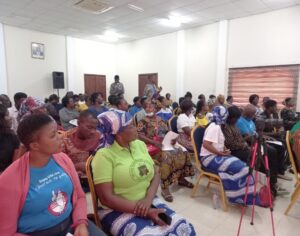Although there are no intentions to ban the use of plastics in the country, government will not hesitate to take drastic measures on plastics when the need arises, Minister for Environment, Science, Technology and Innovation, Dr. Kwaku Afriyie, has said.
Dr. Afriyie argued that ban on the use of plastics is not the first step to be taken as many are insisting, as it is likely to disrupt economic activities of the private sector; but proper measures, such as introducing policies and initiatives, will be of much help.
“As I have reiterated on various platforms, I do not intend to ban plastics or disrupt the activities of the private sector. However, government will not hesitate to take drastic measures when the need arises. And I hope it does not come to that,” he said.
In view of this, a National Policy on Plastics Management (NPPM) has been put in place to deal with the challenges amid several other initiatives.

This will involve improving recycling, promoting re-use, creating a market for recycled materials, and redesigning products with the end of life in mind.
This was said during a sensitisation workshop opened for caterers to arrive at a consensus on how they can support the use of single-use plastics in food packaging at the Accra Tourist Centre.
Dr. Afriyie said he believes the best step to be taken as a people is to reduce the number of plastics used, while reiterating that the plastics crisis is not only a governmental issue, but it involves everyone – to sit around the table to find lasting solutions.
Telling them about their role to play in getting rid of the plastics, he said: “You, the caterers, and everyone involved in the food and beverages industry are key to ridding our environment of plastics. The first consideration should be to prevent excess plastic packaging by switching to alternatives such as card or paper, if possible.
“Adopting the use of reusable containers by going back to basics by using non-disposable food ware made of metal, qualitative plastics, and ceramics. Having dedicated bins for plastics at events will also help with collection,” he noted.
The ministry has developed a concept for plastics management whereby the whole country will be divided into cells or grids, and each cell or grid or multiples of it will be assigned to an association of plastic waste pickers.
Explaining the concept, Dr. Afriyie said: “This area in each segment will be assigned to a particular group of plastic waste collectors. Incentives will be provided for the waste pickers only when plastics, including those termed as ‘orphan’ plastics (Olonka, bread, banku, kenkey, and koko rubbers, etc.) are not found in the segment after monitoring.
The concept will be piloted for 6 months and then evaluated. If the success rate is high, the ministry will replicate it in other parts of the Greater Accra Region. This will then be extended to other parts of the country with the urban centres starting first.”
Among some key participating catering groups of the sensitisation workshop are the indigenous caterers, traditional caterers, as well as heritage food and drinks.










